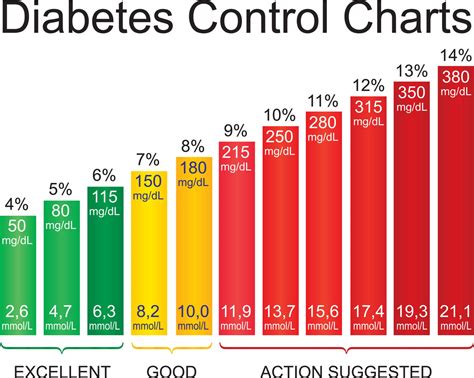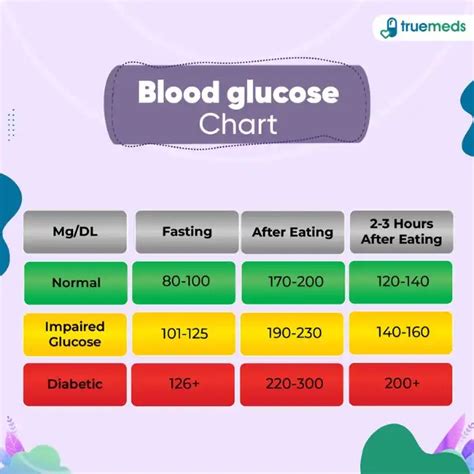Intro
Learn about 5 blood sugar levels, normal range, and fluctuations. Understand blood glucose monitoring, diabetes management, and healthy targets to control glucose levels effectively.
Maintaining healthy blood sugar levels is crucial for overall well-being, as it directly impacts energy levels, weight management, and the risk of developing chronic diseases like diabetes and heart disease. Blood sugar levels refer to the amount of glucose present in the blood, and it is essential to keep them within a normal range to avoid complications. In this article, we will delve into the world of blood sugar levels, exploring what they are, how they work, and the importance of maintaining healthy levels.
The human body relies on glucose as its primary source of energy, and blood sugar levels play a vital role in ensuring that cells receive the necessary fuel to function properly. When we consume food, our body breaks down carbohydrates into glucose, which is then absorbed into the bloodstream. The pancreas produces insulin, a hormone that helps regulate blood sugar levels by facilitating the entry of glucose into cells. However, when blood sugar levels become too high or too low, it can lead to a range of health problems.
Understanding blood sugar levels is essential for individuals who are at risk of developing diabetes or those who are already living with the condition. By recognizing the signs and symptoms of abnormal blood sugar levels, individuals can take proactive steps to manage their condition and prevent long-term complications. In this article, we will explore the different aspects of blood sugar levels, including the benefits of maintaining healthy levels, the working mechanisms of insulin and glucose, and the steps individuals can take to regulate their blood sugar levels.
Blood Sugar Levels: What Are They?

Factors That Affect Blood Sugar Levels
Several factors can influence blood sugar levels, including diet, physical activity, stress levels, and certain medications. For example, consuming high-carbohydrate foods can cause blood sugar levels to rise, while regular exercise can help lower blood sugar levels by increasing insulin sensitivity. Additionally, stress and certain medications, such as steroids and certain psychiatric medications, can raise blood sugar levels. Understanding these factors is crucial for individuals who are trying to manage their blood sugar levels and prevent complications.The Importance of Maintaining Healthy Blood Sugar Levels

Benefits of Healthy Blood Sugar Levels
The benefits of maintaining healthy blood sugar levels are numerous and well-documented. Some of the most significant advantages include: * Improved energy levels and reduced fatigue * Enhanced cognitive function and mental clarity * Better weight management and reduced risk of obesity * Lower risk of developing chronic diseases such as diabetes and heart disease * Improved overall health and well-being By maintaining healthy blood sugar levels, individuals can enjoy these benefits and reduce their risk of developing complications.How to Regulate Blood Sugar Levels

Steps to Take
To regulate blood sugar levels, individuals can take the following steps: 1. Consult with a healthcare provider to develop a personalized treatment plan. 2. Eat a balanced diet that is low in sugar and refined carbohydrates. 3. Engage in regular physical activity, such as walking or jogging. 4. Practice stress-reducing techniques, such as meditation or yoga. 5. Get enough sleep and maintain a healthy weight. By following these steps, individuals can regulate their blood sugar levels and improve their overall health and well-being.Managing Blood Sugar Levels with Medication

Types of Medication
There are several types of medications available to manage blood sugar levels, including: * Metformin: This medication works by increasing insulin sensitivity and reducing glucose production in the liver. * Sulfonylureas: This medication works by stimulating the pancreas to produce more insulin. * Insulin: This medication works by replacing insulin altogether, which is often necessary for individuals with type 1 diabetes. By working with a healthcare provider, individuals can determine the best course of treatment and manage their blood sugar levels effectively.Preventing Complications

Reducing Risk
To reduce the risk of complications, individuals can take the following steps: * Maintain healthy blood sugar levels * Monitor blood sugar levels regularly * Follow a personalized treatment plan * Attend regular check-ups with a healthcare provider * Engage in regular physical activity and eat a balanced diet By taking these steps, individuals can reduce their risk of developing complications and improve their overall health and well-being.Conclusion and Next Steps

The importance of maintaining healthy blood sugar levels cannot be overstated. By taking proactive steps to regulate blood sugar levels, individuals can improve their energy levels, enhance cognitive function, and reduce their risk of developing chronic diseases. We invite readers to share their experiences and tips for managing blood sugar levels in the comments below. Additionally, we encourage readers to share this article with friends and family members who may be at risk of developing diabetes or other health problems.
What are normal blood sugar levels?
+Normal blood sugar levels vary throughout the day, but are typically between 70 and 140 mg/dL.
How can I regulate my blood sugar levels?
+To regulate blood sugar levels, individuals can eat a balanced diet, engage in regular physical activity, practice stress-reducing techniques, and get enough sleep.
What are the benefits of maintaining healthy blood sugar levels?
+The benefits of maintaining healthy blood sugar levels include improved energy levels, enhanced cognitive function, and reduced risk of developing chronic diseases.
How can I prevent complications related to blood sugar levels?
+To prevent complications, individuals can maintain healthy blood sugar levels, monitor levels regularly, follow a personalized treatment plan, and attend regular check-ups with a healthcare provider.
What types of medication are available to manage blood sugar levels?
+There are several types of medications available, including metformin, sulfonylureas, and insulin, which work by increasing insulin sensitivity, reducing glucose production in the liver, or replacing insulin altogether.
